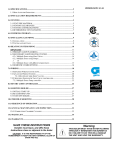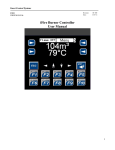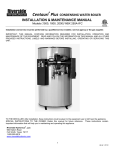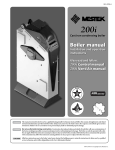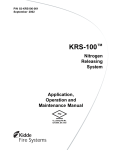Download Service Manual Model: GSWH-1 LP Gas
Transcript
Service Manual Model: GSWH-1 LP Gas Tankless Water Heater For Recreation Vehicles This manual is intended solely for use by trained personnel who perform service or repairs on the Model GSWH-1 Water Heater on behalf of a Girard Products LLC Authorized Service Center. CSA Approved Girard Products LLC, 1361 Calle Avanazado, San Clemente CA 92673 U.S.A Service Manual Part No. 1GWH9405 • 9/7/2010 Patent Pending TABLE OF CONTENTS Service Manual - Model GSWH-1 Title Page 1. Product Identification ............................................................................................. 3 2. Description and Features.........................................................................................4 3. Normal Operation ...................................................................................................5 4. Recommended Tools and Equipment........................................................................6 5. Removing Controls Housing ....................................................................................7 6. Schematics and Diagrams a. Ladder Diagram..............................................................................................8 b. Wiring Diagram ..............................................................................................9 7. Circuit Board Operation .........................................................................................10 8. Exploded View ......................................................................................................12 9. Troubleshooting Guide ..........................................................................................12 10. Circuit Board Troubleshooting ................................................................................13 11. General Failures and Possible Causes and Remedies...............................................14 12. Routine Maintenance ............................................................................................16 13. Winterization ........................................................................................................17 14. Spare Parts List ....................................................................................................17 15. Flat Rate Schedule ...............................................................................................18 Page 2 PRODUCT IDENTIFICATION Water Heater Part Number: 1GWH / 1GWHAF (w/ Winter Use Device) Door Part Number: 1GWHD Serial Number Location: On Rating Label affixed on the inside right of the Controls Housing. Figure 1 Specifications The main performance specifications of the Model GSWH-1 are: BTU/HR 27,000 – 34,000 Fuel Propane (LP Gas) Inlet Pressure 10.5” WCI Min to 14” WCI Max Manifold Pressure 8” – 10” WCI Power Input 12VDC < 3 amp Water Operating Pressure 125 PSI Max Max Water Temperature 125 º F Dimension Width: 12.5” - Height: 12.5” - Depth 15.5” Shipping Weight 22 lbs Page 3 DESCRIPTION AND FEATURES The Girard Products GSWH-1 LP Gas Tankless Water Heater is designed to meet ANSI Z21.10.32004 and CSA 4.3-2004 and is certified by the Canadian Standards Association (CSA) to meet these standards for use in recreation vehicles. The design of this product differs from the traditional storage tank water heater units found in RVs. More specifically: • The Girard Tankless Hot Water System uses a finned copper heat exchanger and nine high efficiency blade burners • The Motor Aided Induced Draft enhances combustion for increased efficiency and improved wind resistance • A Dual BTU Gas Valve optimizes the output temperature range based on the temperature of the input cold water and water flow When properly installed in a Recreation Vehicle the Girard Tankless Water Heater is connected to: • The RV’s cold water system with its water input from a pressurized (45 psi) source such as a shore connection or a water storage tank with water pump. • The RV’s hot water system (i.e. faucets and shower) • The RV’s LP Gas system capable of supplying the rated BTU requirement. • The RV’s 12VDC Electrical power distribution panel on a 10 amp fused circuit Please refer to the Owners Manual supplied with the unit for further information. The Owners Manual will allow you to verify if the unit is properly installed and the connections are within the following recommended parameters: • The pressure of the water supply is between 40 and 60 psi for normal operation • The LP Gas system is operating within the inlet pressure limits indicated on the rating label (10.5” and 14” WC) • The DC Voltage applied is greater than 11.5 and less that 14 VDC Figure 2 Page 4 NORMAL OPERATION A tankless water heater, also referred to as an “on demand” water heater, rapidly heats water as it flows around and through the heat exchanger. The output water temperature depends on the temperature of the input water and the flow established at the faucet by the user; the faster the flow, the cooler the water; the slower the flow, the hotter the water. The gas control valve of the GSWH-1 and the GSWHAF-1 features a dual BTU solenoid that can operate in ‘High’ mode (34,000 BTUs) or ‘Low’ mode (27,000 BTUs) depending on the input temperature of the cold water. Colder water (65°F or less) causes the burner to operate in ‘High’. Warmer water (70°F or more) causes the burner to operate in ‘Low’. NOTE: When the input water temperature is between 65°-70°F the unit may operate in ‘High’ or ‘Low’ depending upon precise thermostat settings. A thermostat setting may vary +/- 5°F. Prior to normal operation the user must ensure that all air has been purged from the water lines, the Water Heater Power Switch is in the ‘ON’ position and the REMOTE Mode Switch (see below) is set in the desired position (AUTO or LO). The 12VDC power is normally left ON while the RV is in use with no use of LP gas. In many cases the switch may be set to ‘On’ the entire camping season. This will not harm the unit in any way. To start the water heater the user should fully open the hot water faucet, wait for hot water to flow and decrease the flow (which results in hotter water) to obtain the temperature desired. Note: although the Girard tankless water heater is instantaneous, the water in the system (pipes) must be purged before the user will feel hot water at the faucet. Thus, the further the water heater is located from the faucet/shower the longer it will take for the user to feel hot water. The ideal location for any water heater is in the center of the coach. During normal operation the hot water faucet behaves somewhat like a typical mixing valve: it (faucet) increases the water temperature when turned clockwise (reducing the water flow) and decreases the water temperature when turned counterclockwise (opening and increasing the water flow). The user may mix the hot water with cold water, but normally this is not recommended: The increased total flow (Hot plus Cold) will reduce the inlet pressure; which in turn, reduces the flow of water through the heat exchanger of the water heater: this will cause the hot water output temperature to increase defeating the effect of the cold water. In some cases adding cold water may result in limiting. (See last paragraph, this section) When the Mode switch is set to AUTO, a thermostat will cause the burner to switch automatically from High to Low when the inlet water temperature goes above 70 ºF and from Low to High when it goes below 65 ºF. Note: A thermostat setting may vary +/- 5°F. If the output temperature exceeds 123 ºF an Emergency Cut-Off (ECO) thermostat will shut down the unit to prevent scalding; this operation is both normal and desirable and is commonly referred to as “limiting”. Page 5 As a convenience, a Mode switch is installed to manually force the burner to operate only in LOW mode. Operating the system exclusively in LOW mode allows better temperature control when inlet water flow is minimal and the inlet water temperature is between 70° and 65 ºF and the automatic control has not yet automatically switched to Low mode. The switch must manually be reset to Auto in order for the system to operate automatically. Important: When the inlet water is below 50 ºF (input water is very cold), the hot water flow must be reduced to .75gpm or less .to reach an output temperature above 100 ºF. If the input water temperature is approximately 60ºF or greater, the model GSWH-1 will generate output water in the range of 95 °F to 120 °F depending on the water flow. RECOMMENDED TOOLS AND EQUIPMENT No unusual tools and/or equipment are needed to service the Girard Tankless Water Heater. The following equipment is commonly used for service and is readily available. Be sure that all instruments are regularly calibrated. U-Tube or Dial Type Manometer This device is for measuring the gas pressure. If using a dial type manometer please insure that it is regularly calibrated. U-Tube Manometer Dial Type Manometer Gas Leak Test Solution There are many inexpensive solutions on the market that bubble when applied to fittings where a leak is present. Multimeter Used for testing Continuity, Voltage, Current (AC/DC) and Resistance. With a good quality Multimeter you can verify voltage problems and defective components. The entire electronic system can be tested with this meter. Fenwal Board Tester or Similar Approved Tester Used for testing the Circuit Board. This tester will diagnose the power circuit, sense circuit, spark igniter and lock-out mode. Fenwal part # 05-080224-009) ON VALVE CHE CK CURCUIT BOARD TESTER OFF IGNI TER OFF REM OTE FLAM E Page 6 Hand Tools: • Phillips and flat head screw drivers • 9/16”, 3/4” and 13/16” S.A.E. open wrenches • 7mm and 5.5mm nut drivers and/or wrenches. • Needle nose pliers, wire crimp and cutter. • Leak Test Solution. REMOVING CONTROLS’ HOUSING No unusual tools and/or equipment are needed to service the Girard Tankless Water Heater. The following equipment is commonly used for service and is readily available. Be sure that all instruments are regularly calibrated. To gain easy access to the serviceable components of the Water Heater you must first remove the Controls’ Housing that shields and supports the following: • Circuit Board • Dual BTU Gas Control • Main Gas Line • Ground connections • Power switch with the LED indicator Figure 3 1. Loosen the Power Strain Reliever nut at the back of the unit to allow the wiring harness to be pulled into the housing as needed. Page 7 2. Remove the Hex Nuts, Lock Washers and Washers, along the lower edge of the Control Housing and set aside for re-assembly. 3. Reach inside along the left side of the housing but behind the Controls’ Housing and locate the small Wing Nut along the side wall (item 2). Remove and set aside for re-assembly. 4. Disconnect the Burner Tube from the Burner Assembly (item 3) using a 9/16” open end wrench being careful not to damage the tube. Set aside for re-assembly. 5. Lean the Controls’ Housing to the right to slip it out of the wing nut’s post and lift it to clear the bottom posts. 6. Remove the assembly from the Main Housing as far as the wiring harness will allow. If necessary cut the wire ties being careful not to cut the wires (be sure to replace them (wire ties) when the job is done). SCHEMATICS AND DIAGRAMS The following schematics and diagrams will help to provide a better understanding of the operation of the Model GSWH-1 Water Heater and to trouble shoot the most common malfunctions. Figure 4 Page 8 Please refer to the electrical diagram for a functional understanding of the electrical components and of the Circuit Board control functions. Wiring Diagram Cold Hot Heat Exchanger Gas Valve 12VDC (Red) --12VDC Ground (Black) - - Ground (Green) - Gas Valve (Brown) ••••••• LED (Diagnostics) •u•••• 12VDC Row I Limit I Air Figure 5 Page 9 CIRCUIT BOARD OPERATION When the user opens a Hot Water faucet, water starts flowing through the unit and activates the Flow Switch which in turn activates the Relay; this applies 12VDC power to the ECO (Emergency Cut-Off Thermostat) and to the “Heat Demand” Connection (5) of the Circuit Board (see below). Change to: ….ECO (Emergency Cut-Off Thermostat) and to the ‘TH’ Connection (2) of the Circuit Board. Power is then applied to the Sail Switch that is open when there is no air flow from the blower. The ECO is normally closed. The Circuit Board starts the blower and verifies that the Sail Switch closes: when this occurs the Circuit Board will sense the 12VDC at the Circuit Board indicating that there is sufficient air flow for combustion. The circuit is now complete. Try For Ignition (TFI) The Circuit Board is now ready to try for ignition and applies power to the gas valve through connection (4) and without delay generates a spark of five (5) seconds duration at the igniter. If the Circuit Board does not sense flame at the spark igniter, the gas valve is de-energized and an internal post purge of 15 seconds will occur before a second try is attempted. Two additional tries will be attempted and if no flame is detected in the process the Circuit Board goes into LOCKOUT mode and will make no further attempt to light. Once the system has entered lockout mode, it must be reset. To reset the water heater, turn OFF power to the water heater OR close the faucet (removing the demand for hot water for a period of five (5) seconds. Figure 6 P a g e 10 Whenever the Circuit Board senses flame during the ignition trials, sparking stops and the Gas Valve remains energized. The Water Flow Switch, the Sail Switch and the Burner flame are constantly monitored to assure that the system continues to operate properly. When the Hot Water faucet is closed and the Flow Switch opens, the demand for heat ends and the Gas Valve is de-energized immediately; after the post purge and cool off period of 90 +/seconds the blower is turned off. Flame Failure If the established flame signal is lost while the burner is operating, the control will sense this and respond within 0.8 seconds. The gas valve will stay energized and the Ignition Spark will be energized in an attempt to relight the burner (trial for ignition). If the burner does not light, the control will make two more attempts to relight and then go into lockout (See Try for Ignitionpage 10). If flame is established. Combustion Airflow Problems If the airflow signal is lost, or the ECO opens during heat mode, the gas valve is immediately de-energized and the blower stays on. If the switch closes again, a normal ignition sequence will resume. If not and this condition persists for more than five minutes, the control will enter lockout (See Try for Ignition - page 10) with the blower off. Water Heater LED Diagnostics If the water heater stops operating normally, check the LED indicator on the user panel located behind the water heater door. If the LED is lit or blinking, consult the list below to help diagnose the fault detected by the Circuit Board: • Steady On – • 1 Flash – • 2 Flashes – • 3 Flashes – • 4 Flashes – • 5 Flashes – Internal Control Fault Air Fault Flame Detection Error Lockout N/A; Reserved for future diagnostics Low voltage The pattern will be repeated at intervals of 3 seconds. P a g e 11 TROUBLE SHOOTING GUIDE This section includes the most common symptoms that may be found in a model GSWH-1 that is not operating normally. Please refer to the following drawing to locate the components in the unit: Limit Switch Exhaust Collector Blower Motor Assembly Support Sail Switch Circuit Board (Fenwal) Heat Exchanger Housing Diagnostic LED Exhaust Tube Relay Wire Connections Hot Water Flow Switch Cold Water Gas Burner Auto-Lo Thermostat Gas Control Valve Power Switch Anti-Freeze Thermostat Burner Manifold Control Panel Housing Door Flange Door EXPLODED VIEW OF MODEL GSWH-1 AND MAJOR COMPONENTS IDENTIFICATION Figure 7 NOTICE: Before starting the troubleshooting steps suggested below verify that: • There is power connected to the water heater • The power switch is in the ON position • The wiring is not damaged in any way • All connectors are plugged in (no dangling connectors) • Water flowing through the unit when you open a hot water faucet • The Sail Switch is moving freely (forward and backward) • The gas is connected and the gas tank is not empty P a g e 12 CIRCUIT BOARD TROUBLESHOOTING The Circuit Board is the electronic controller for the Water Heater. It is very reliable but it is often diagnosed improperly and replaced. Note: in all cases the replacement of the Circuit Board is the last item. We provide here a list of symptoms and their possible causes to help you to determine if the problem is due to a malfunction of the board or other components. 1. Dead a. Fuse/Circuit Breaker Bad b. Converter/battery bad c. Mis-wired – Check ‘On/Off’ Switch for Incoming Power d. No voltage @ POWER or BLOWER connections - Check for Broken Wire e. Bad circuit board: CONFIRM with Approved Board Tester such as Fenwal part # 05-080224-009) – Replace 2. Flow Valve Activated - No Blower Output a. Mis-wired or Failed Sail Switch - Check Wiring b. Check Relay c. Check ECO d. Check Wiring to Board e. Defective or Stuck Flow Switch: Tap with Wrench; If Problem not Solved, Replace Flow Switch f. Bad circuit board: CONFIRM with Approved Board Tester such as Fenwal part # 05-080224-009) - Replace 3. Sail Switch Input Okay - No Trial for Ignition a. Mis-wired – Confirm Wiring and Connections b. Check Sail Switch for Continuity c. Bad circuit board: CONFIRM with Approved Board Tester such as Fenwal part # 05-080224-009) - Replace 4. Gas present but no Spark a. Misaligned Electrode – Ensure Gap Between Electrode Tip and Burner Blade is 1/8” and into Path of Flame b. Check for Continuity on Electrode High Voltage Cable c. Check for Coil on Circuit Board d. Bad circuit board: CONFIRM with Approved Board Tester such as Fenwal part # 05-080224-009) - Replace 5. Spark present but no Gas a. Check Gas Supply b. Check Valve Connections c. Check for Proper Voltage - Minimum of 10.5 VDC d. Check Edge Connectors for oxidation - Clean and Replace e. Check Resistance (ohms) Draw on Coils - Should be 30 - 50 ohms P a g e 13 6. Flame okay during trial for ignition (TFI), no flame sense (after TFI) a. Check Electrode and High Voltage Wire for Continuity b. Poor ground at burner c. Bad circuit board (check flame current); CONFIRM with Approved Board Tester such as Fenwal part # 05-080224-009) - Replace GENERAL FAILURES AND POSSIBLE CAUSES AND REMEDIES 1. No Blower, no Spark and no Gas a. No or Low Voltage: Correct Power Supply - Minimum 10.5 VDC b. Defective ON/OFF switch: Check for Power Coming into Switch; If no Power, Replace Switch c. Defective or Stuck Flow Switch: Tap with Wrench; if Problem not Solved, Replace Flow Switch d. Check Relay e. Check ECO f. Dirty Edge Connector on Circuit Board: Clean Edge Connector g. Defective circuit board CONFIRM with Approved Board Tester such as Fenwal part # 05080224-009) - Replace 2. No Spark and No Gas (Blower Operating) a. Low voltage: Correct Power Supply - Minimum 10.5 VDC b. Check for Flow of Water c. Check Relay d. Check ECO e. Check for Flow of Power OUT of Sail Switch to Circuit Board f. Dirty edge connector on circuit board: Clean edge connector g. Defective circuit board: Confirm with Approved Board Tester such as Fenwal part # 05080224-009) - Replace 3. Water Heater Lockout - Spark present but no gas a. Check Gas Pressure: Set inlet pressure at a Minimum 11˝ W.C. with Two or More Gas Appliances Running. b. No or Low Voltage: Correct power supply - 10.5 VDC Minimum c. Loose Wire Connections on Gas Valve. Confirm Connections d. Test Resistance of Coils - Confirm 30 - 50 ohms e. Defective gas valve: Replace Coils or Gas Valve f. Dirty connector on Circuit Board: Clean Edge Connector g. Defective circuit board: CONFIRM with Approved Board Tester such as Fenwal part # 05-080224-009) - Replace P a g e 14 4. Water Heater Lockout – Gas present but no Spark a. High Tension Lead Wire Loose: Secure Wire Connection on Circuit Board b. Poor Ground Connection at Burner: Secure Ground Connection to Main Burner c. Improper Electrode Gapping: Re-position Spark Gap Between Electrode Tip and Burner Blade to 1/8˝ and into Path of Flame d. Dirty Electrode: Clean Electrode e. Wires Loose in Electrode Porcelain: Replace Electrode f. Cracked Porcelain on Electrode: Replace Electrode g. Defective circuit board. CONFIRM with Approved Board Tester such as Fenwal part # 05080224-009) - Replace 5. Water Heater Lockout – Gas and Spark Present a. Check Gas Pressure: Set inlet pressure at a Minimum 11˝ W.C. with Two or More Gas Appliances Running. b. No or Low Voltage: Correct power supply - 10.5 VDC Minimum c. Poor Electrical Ground: Secure Electrical Ground d. Dirty Electrode: Clean Electrode e. Partial Obstruction in Main Burner: Check for Complete Ignition of Burner Blades through Sight Hole. Remove any Obstructions. f. Partially Obstructed Burner Manifold: Clean Burner Orifices; Replace if Necessary g. Dirty Connector on Circuit Board: Clean Edge Connector h. Defective circuit board. CONFIRM with Approved Board Tester such as Fenwal part # 05080224-009) - Replace 6. Erratic or Uneven Burner Flame a. Check Gas Pressure: Set inlet pressure at a Minimum 11˝ W.C. with Two or More Gas Appliances Running b. Partial Obstruction in Main Burner: Check for Complete Ignition of Burner Blades through Sight Hole. Remove any Obstructions c. Obstructed Exhaust Tube Grill. Inspect and Remove any Obstruction d. Partially Obstructed Burner Manifold: Clean Burner Orifices; Replace if Necessary 7. Excessive or Insufficient Water Temperatures; Water Not Hot or Water Cold a. Air is present in water lines: Purge Air from Water Lines b. Thermostat not Seated Against Sensing Tab: Reseat Thermostat and Add Thermal Paste to Insure Good Contact c. Defective Thermostat: Replace Thermostat d. In Case of Excessive Temperature, Verify that the Maximum Flow is not Limited by a Flow Restrictor P a g e 15 ROUTINE MAINTENANCE We recommend that the GSWH-1 water heater be inspected regularly by the user and at least once a year by a qualified service technician. Before an inspection make sure that the LP Gas and Water supply are connected and turned on. A routine inspection must include the following items: 1. Inspect the integrity of the sealing (caulking or tape) between the side wall and the door of the water heater and make sure that the unit is solidly mounted to the vehicle. 2. Verify that the air inlet openings (louvers) are completely open and clear of any debris including mud, leaves, twigs, insects etc. Remove all obstructions to allow full air flow. 3. Inspect the Exhaust tube and make sure that it is also unobstructed and that the Exhaust screen is clean. 4. Open the cover and verify that no debris or extraneous combustible materials are present anywhere (especially in the area of the burner and the gas controls); remove any item present and wipe clean the bottom of the housing. 5. Inspect the interior surface of the housing for any cracks or corroded areas that could allow penetration of gases into the interior of the vehicle. Check especially around the Hot Water, Cold Water, Gas and electrical connections. 6. Check that all wire connections are firmly in place and there are no signs of chafing or cracks on the wire insulation. Note that the spark ignition cable between the Circuit Board and the igniter is securely in place and not shorted to any metal component. 7. At least once a year activate the Relief Valve by lifting the lever on top of the valve. MAKE SURE THAT THE WATER HEATER HAS NOT BEEN ON RECENTLY AND THE HOT WATER OUTLET IS COLD. 8. Turn on the power to the water heater and open a hot water faucet to inspect the flame of the burner. The flame should be of the normal bluish appearance that indicates proper combustion. This can be accomplished by observing the flames through the sight hole and looking at the burner under the edge of the heat exchanger (See Figure 9.). Flame Sight Hole Figure 9 Flame at top of burner P a g e 16 WINTERIZATION Freezing of the water heater and its plumbing components will result in severe damage that is not covered by warranty. For this reason it is not advisable to use the standard unit (Part# 1GWH) in the winter without installing the Winter Use Device (See below for Winter Use Device option). At the start of the winter season or before traveling to a location where freezing conditions are likely the unit must be winterized. The very small amount of water present in the heat exchanger does not require the installation of a bypass kit. Winterization can be accomplished using one of the two common methods of winterization used for RV water systems: • Compressed Air Method: Drain all water from the system opening one tap at a time and using compressed air to purge all remaining water. • RV Anti-freeze Method: Follow the recommendations of the Recreation Vehicle manufacturer and fill the system with a non toxic anti-freeze. Make sure that the antifreeze flows from each tap to complete the process. PARTS BREAKDOWN Item Name Part # 1 Burner Assembly 1GWH1000 2 Igniter/Flame sensor 1GWH6310 3 Heat Exchanger/Exhaust Assembly 1GWH2000/1GWH3000 4 Blower Motor 12 VDC 1GWH6200 5 Cold Water Inlet Assembly 1GWH5100 6 Water Flow Switch 1GWH7100 7 Relay 1GWH6800 8 Hot Water Outlet Assembly 1GWH5300 9 P/T Relief Valve (1/2"NPT) 1GWH7200 10 Gas Valve Control 1GWH6100 11 Circuit Board and cover 1GWH7300 12 ECO (Limit Switch) 1GWH6500 13 Sail Switch 1GWH6600 14 Power/Mode Switch (ON/OFF) 1GWH6700 15 Door Assembly 1GWH4400 16 Door Flange 1GWH4300 17 Flue Exhaust tube 1GWH4700 18 Winter Use Device for GSWH-1 (Aftermarket) 1GWH9404 19 Conversion Flange for Atwood 6 Gallon Polar White 1GWHDA6 20 Conversion Flange for Atwood or Suburban 10 Gallon Polar White 1GWHDAS10 Figure 10 P a g e 17 FLAT RATE SCHEDULE Effective 01/01/2010 TIME ALLOWANCE (in hours calculated at 1/10th hour - 6 minutes) General Trouble Shooting Diagnostic Testing: 18 minutes (.30 hour) Replacement of Component: Complete Water Heater Door Frame (Flange) Flue Tube Exhaust Bracket Control/Gas Housing Plate Circuit Board Gas Control Valve w/inlet fitting LP Gas tube (from valve to burner) Burner P/T Relief Valve Hot Water Outlet Manifold Assembly Flow Switch Cold Water Inlet Manifold Assembly ECO Sail Switch Relay Power (On/Off) Switch Mode Switch (Hi/Low Burner) Diagnostic LED Winter Use Control Unit Winter Use Thermostat Hours 1.00 .50 .10 .20 .50 .40 .40 .10 .40 .40 .20 .40 .30 .10 .20 .30 .10 .10 .10 .30 .10 Minutes 60 30 6 12 30 24 24 6 24 24 12 24 18 6 12 18 6 6 6 18 6 Figure 11 • For any component replacement that does not appear on the above list, contact Girard Products LLC for authorization and instructions. • To process a warranty claim the Service Center must be an authorized Girard Products, LLC Service Center. • Authorized Service Centers must obtain prior approval for work that exceeds the flat rate time allowances. • Operational failure caused by improper installation or the use of non GSWH-1 components will result in the warranty claim being denied. P a g e 18



















